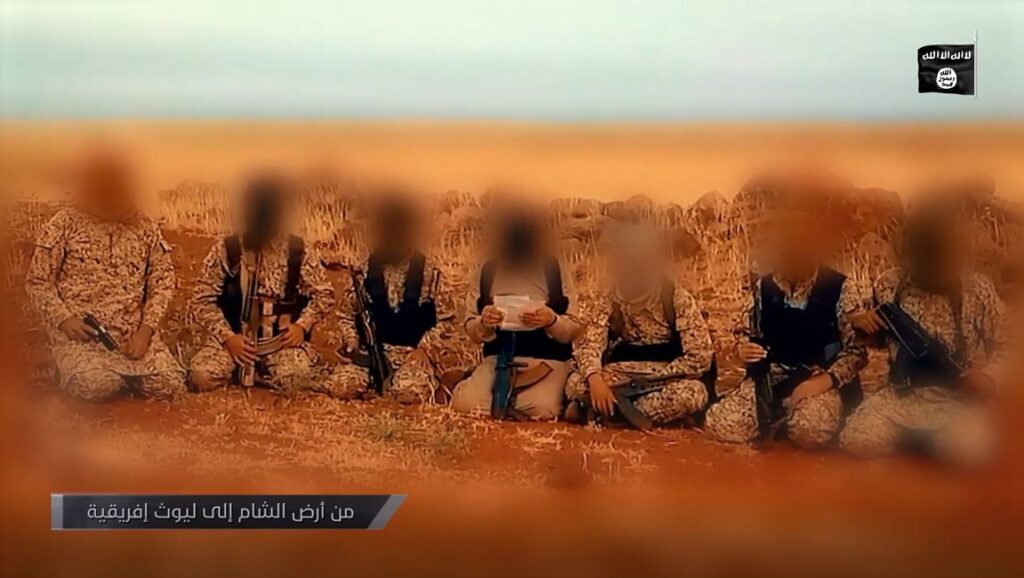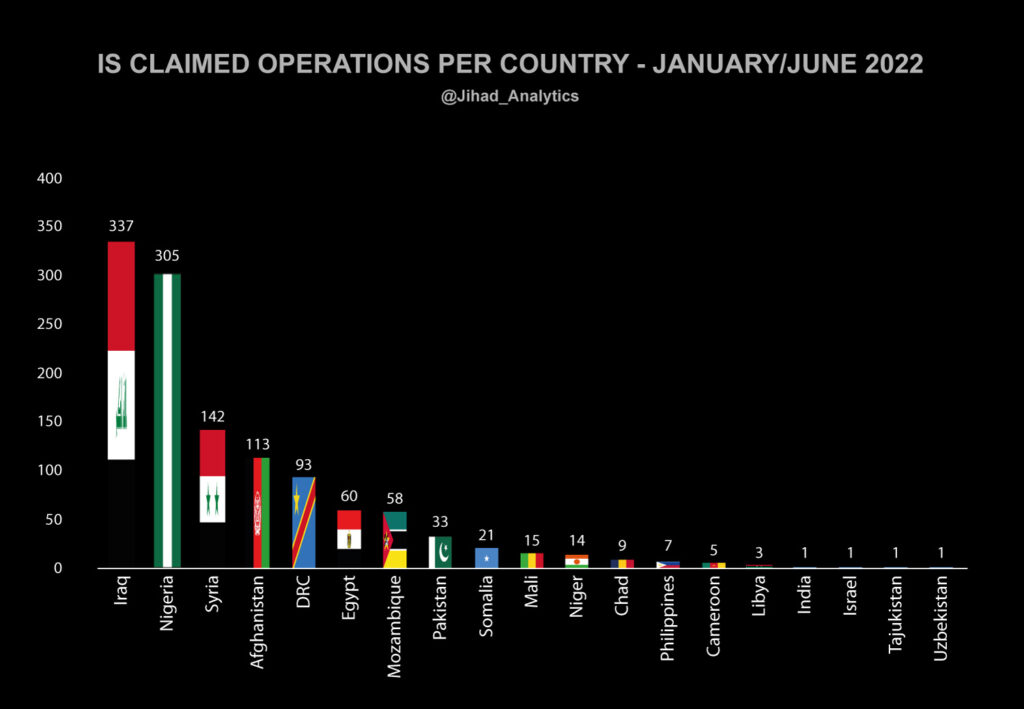Hijra And Jihad: What Islamic State’s Call For Migration Means For Terrorism In Africa
ISIS has intensified its operations and plans to expand in Africa after the loss of territory in Iraq and Syria. The group, through a series of propaganda messages, is encouraging supporters to relocate to the continent.

The Islamic State in Iraq and Syria (ISIS) has recently focused on Africa, encouraging its fighters to migrate there in order to establish a new strong base of operations. In a series of propaganda messages, ISIS referred to Africa as a new land of Hijra (Migration) and Jihad, and stated that its fighters would operate in the same manner as in Syria and Iraq until the establishment of a strong caliphate.
“Muslims have seen in recent years how Africa has turned into a land of Hijra and Jihad, which migrants who don’t like living under satanic and jahili (un-Islamic) leaders move to for fighting for the sake of Allah and promoting His words,” stated the ISIS Al-Naba editorial of June 16, 2022.
Two weeks later, the group released another video featuring fighters from its central operations, praising the fighters in Africa, and demonstrating their alliance. ISIS fighters were seen in the video encouraging Jihadists in Africa to keep pushing until the re-establishment of their one-time caliphate, which it had taken four years of a global coalition to disintegrate. It seems the group is now planning to reemerge in Africa.

Africa is said to be a fertile ground for ISIS to achieve its goal. According to analysts, terrorists are looking for a location with rampant corruption, religious and ethnic conflicts, and a high level of poverty in order to recruit followers with grievances so that local security forces are unable to respond to them. Africa, they said, is an epitome of that.
Despite its losses in Syria and Iraq as a result of the international military intervention, the landless ISIS has continued to provide support to affiliated groups, including at least nine official sub-groups in Africa — some in the Sahel, Lake Chad region, Central and North Africa.
The United Nations issued a report in 2021 on the threat of Islamic State expansion in Africa, with Italian Foreign Minister Luigi Di Maio expressing concern that terrorists are consolidating in the continent, posing a significant threat in a region with numerous security gaps. According to the 2020 Global Terrorism Index, the expansion of ISIS affiliates into Sub-Saharan Africa resulted in an increase in terrorism in many countries.
Between January and June 2022, available data indicates that the Islamic State has carried out more attacks in Africa than in other regions it operates around the world. Nigeria alone recorded 305 attacks in six months, which was second only to Iraq with 337 incidents.

According to the Al-Naba editorial, the continent is yet to see a strong presence of Western Forces, implying minimal military resistance against their operations.
The recent interest particularly towards the Lake Chad affiliate is a continuation of an old process that has involved the provision of financial, training, and guidance support. ISIS also authorised the operations against Boko Haram (the Jama’atu Ahlussunnah Lidda’awati Wal Jihad faction) which culminated with the death of Abubakar Shekau.
In its propaganda messages, ISIS has elevated ISWAP to the status of a new queen. According to a Crisis Group report, ISWAP appeared in 22 of ISIS’s 41 propaganda messages and appeared in 57 Al-Naba covers in 2021. That was more than any other ISIS franchise in the world. Strategies and attacks are sometimes carried out within the group in accordance with ISIS guidance, and the results are published in the group’s media wing.
ISWAP’s ideology has also allowed it to exploit the local environment and population. The group collects taxes from farmers and herders in areas under its control in exchange for security and access to agricultural resources. Its propaganda messages have demonstrated how the organisation provides financial support through the use of Zakat and allows marketers to open stores which are regulated by the religious police (Hisbah).
According to reports, the organisation dug wells, prohibited cattle rustling, and provided some healthcare services to residents of its controlled communities. This approach is part of its governance model to win the hearts and minds of locals and create a support base that will potentially serve as recruiting pool.
This does not mean that the group does not pose a risk to civilians or stopped enforcing its violent interpretation of Islamic law, but the Jihadists are attempting to control the populace and communities without resorting to arbitrary attacks or property confiscation, as Boko Haram did.
Aside from local recruitment, Hijra is a critical ideological pillar in Jihadist operations. It is one of the key doctrinal issues that divided Boko Haram, with Shekau’s faction believing that anyone who has not migrated to where Jihadists are and has chosen to live in the “land of infidels” (Darul Kuffar) is by definition an unbeliever. It also means that anyone who wants to join the Jihadists but is unable to fight the government must travel to wherever they declare to be the land of Hijra.
The concept was inspired by the Prophet Muhammad’s journey from Mecca to Medina. Salafi-Jihadists have used it in their propaganda messages to encourage followers to migrate to their strongholds in the traditional divisions of Darul Harb (abode of war) and Darus Salam (abode of peace), where war and peace are justified according to their political theology.
The new ISIS push towards migration means that a network of operatives, unofficial affiliates, and other supporters could be encouraged to move and support the local forces. Experts believe this could lead to increased levels of violence.
The defeat of ISIS in Iraq and Syria had no significant effect on the operations of its African affiliates. Neither the loss of land nor Abu Bakr Al-Baghdadi’s death has had an impact on their operations. In a series of videos released by the groups immediately after his death, the terrorists in Africa offered new bay’a (allegiance) to the now-dead Abu Ibrahim Al-Quraishi, and they continued attacks on their individual levels.
Several attacks also followed an audio message by the Islamic State spokesman, Abu Omar al-Muhajer, on April 17, calling for the attacks to avenge the death of Abu Ibrahim al-Qurayshi and the group’s former spokesman, Abu Hamza al-Qurayshi.
The attacks have continued to escalate even as the terrorists were paying allegiance to the new ISIS leader, Abu Alhassan, with ISWAP having the largest representation from the collage of pictures released by its parent group.
Support Our Journalism
There are millions of ordinary people affected by conflict in Africa whose stories are missing in the mainstream media. HumAngle is determined to tell those challenging and under-reported stories, hoping that the people impacted by these conflicts will find the safety and security they deserve.
To ensure that we continue to provide public service coverage, we have a small favour to ask you. We want you to be part of our journalistic endeavour by contributing a token to us.
Your donation will further promote a robust, free, and independent media.
Donate HereStay Closer To The Stories That Matter




